|
|
|
Sort Order |
|
|
|
Items / Page
|
|
|
|
|
|
|
| Srl | Item |
| 1 |
ID:
173864


|
|
|
|
|
| Summary/Abstract |
Social capital research has measured the concept in two distinct ways: through direct reporting by participants in cross-national surveys and the presence of associative organisations. Both strategies raise difficulties: the former restricts comparability and assumes group stability; the latter relies on literal translation and uses direct questioning. We problematise these approaches and argue that the ratio of ‘check-points’ where individuals are asked to demonstrate adherence to rules, and ‘trust-points’ where such proofs are not required, can better measure social capital. Moreover, the unevenness of social capital between groups is perceptible by ‘fast-lanes’ that differentially treat individuals based on identity. Evidence from a field survey and observational evidence in South Africa is presented.
|
|
|
|
|
|
|
|
|
|
|
|
|
|
|
|
| 2 |
ID:
185906
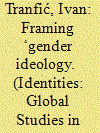

|
|
|
|
|
| Summary/Abstract |
This paper explores the role of the Catholic Church in the articulation of populist discourse. By analysing the frames in Catholic doctrines and their dissemination by the Croatian clergy, I make three contributions. Firstly, in contrast to research on the populist radical right, which demonstrates the manipulation of religion committed by secular actors, I identify the Church as an influential source and producer of the populist master frame. Secondly, I demonstrate how the bridging of the ‘gender ideology’ frame to this populist master frame allows the national Church to articulate traditionalist stances on morality policies. Thirdly, I identify the local-level argumentation strategies, empowered by frame bridging with anti-communist, nationalist, and sovereignist themes typical of radical-right populism. Focusing on religious actors’ agency allows us to improve theories rooted in the secular world of populist politics that neglect churches as important sources of populist discourse and mobilisation.
|
|
|
|
|
|
|
|
|
|
|
|
|
|
|
|
| 3 |
ID:
092004
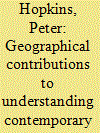

|
|
|
|
|
| Publication |
2009.
|
| Summary/Abstract |
In recent years, geographers have been giving increasing attention to religion- and Islam in particular-yet such work is rarely referred to within the broader social science literature about Islam and Muslims. This paper seeks to promote interdisciplinary dialogue, discussion and debate by highlighting the contributions that human geographers are making to understanding of contemporary Islam. In particular, I draw upon research within urban, social, cultural and feminist geographies to review current trends within geographical scholarship about Muslims individuals and communities. I then use this paper to suggest ways in which interdisciplinary research-in collaboration with human geographers-might seek to advance contemporary understanding of the social and spatial experences of Muslim families and communities.
|
|
|
|
|
|
|
|
|
|
|
|
|
|
|
|
| 4 |
ID:
149109


|
|
|
|
|
| Summary/Abstract |
The paradigm wars between quantitative and qualitative methodologists have focused on the validity and reliability of theory testing, with increasing concerns for transparency in both types of work. But not all research topics lend themselves to theory testing and, rather, require the generation of new theoretical concepts. The relative lack of attention to the “why” and “how” of qualitative theory generation has stunted innovation, forcing scholars to avoid such work or “reinvent the wheel” rather than build on community accomplishments. This article shows that grounded theory methods from sociology provide useful techniques for theory generation and can help scholars break through theoretical muddles. These methods have the added benefit of utilizing a workflow management that lends itself to more transparency than is common in much qualitative work. This article concludes by suggesting steps to boost transparency for grounded theory in international relations and push out the knowledge frontier.
|
|
|
|
|
|
|
|
|
|
|
|
|
|
|
|
| 5 |
ID:
138939
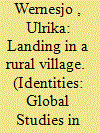

|
|
|
|
|
| Summary/Abstract |
This article explores how unaccompanied young refugees living in a rural village in Sweden make sense of home and belonging. From a post-structuralist approach, belonging and home are understood as ongoing processes that are negotiated with others, and via processes of othering and racialisation. This article demonstrates that the form of housing available, together with experiences of social exclusion in the village, may contribute to othering and thus challenge their feelings of home and belonging. However, they do construct some kinds of belonging and feelings of home based on social relationships and places that they have access to.
|
|
|
|
|
|
|
|
|
|
|
|
|
|
|
|
| 6 |
ID:
140210
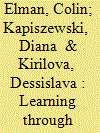

|
|
|
|
|
| Summary/Abstract |
We agree with Druckman’s (2015) view that a liberal arts education should equip students with “the tools needed to address and resolve problems in a variety of domains” (Druckman 2015 ). We are also sympathetic to his related observation that for “social scientists, this means educating students so that they know how to apply the basic scientifi c method of asking questions, generating theories and hypotheses, collecting data, and analyzing results” (ibid.)
|
|
|
|
|
|
|
|
|
|
|
|
|
|
|
|
| 7 |
ID:
163752


|
|
|
|
|
| Summary/Abstract |
The quality of social science inquiry examining terrorism, insurgency, and nonviolent civil resistance has progressed rapidly in recent years. One reason for this advancement is the emergence of new datasets and the subsequent application of quantitative methods to the analysis of asymmetric political conflict between states and nonstate actors. Despite rapid development within the research paradigm, the use of new data has coincided with several methodological and conceptual challenges. This inquiry employs insights from qualitative social science methodology and organizational sociology to highlight and propose solutions to three shortcomings found in recent quantitative analyses of asymmetric conflict. The first problem arises from scholars’ proclivity to ask research questions based on easily accessible categories of data rather than on theoretically significant puzzles in the literature. The second pitfall concerns limitations and “conceptual stretching” associated with static, nominal variables constructed to enable statistical inference. Finally, the third class of research obstacles arises from selection bias caused by underreporting of data. Each of these methodological problems potentially undermines theoretical claims made in recent work on insurgent organizations, terrorism, civil war, and nonviolent resistance.
|
|
|
|
|
|
|
|
|
|
|
|
|
|
|
|
| 8 |
ID:
110667
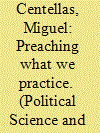

|
|
|
|
|
| Publication |
2011.
|
| Summary/Abstract |
Recent discussions of teaching research methods have focused on understanding the relationship between methods courses and the broader discipline, including the need to integrate qualitative methods and other approaches beyond the traditional statistical approaches still common in the majority of undergraduate research methods courses. This article contributes to this conversation by arguing that the basic elements of research design and qualitative techniques should be integrated into substantive (or "non-methods") courses across the discipline. To accomplish this aim, I offer a brief outline of methodological benchmark skills-drawn from the pool of skills necessary for a successful thesis-that can be taught in various courses across the discipline through a traditional assignment: the semester research paper.
|
|
|
|
|
|
|
|
|
|
|
|
|
|
|
|
| 9 |
ID:
096192


|
|
|
|
|
| Publication |
2010.
|
| Summary/Abstract |
Political science has witnessed a renaissance in qualitative research methods (Bennett and Elman 2006). Over the last 15 years, the canon has been reworked to systematize and expand the repertoire of qualitative methods, ground them more firmly in contemporary philosophy of science, and illuminate their strengths relative to quantitative and formal methods (Bennett and Elman 2007). A rapidly expanding body of political science research now employs qualitative and multi-method analysis, and institutions dedicated to qualitative and multi-method research have flourished.
|
|
|
|
|
|
|
|
|
|
|
|
|
|
|
|
| 10 |
ID:
178918


|
|
|
|
|
| Summary/Abstract |
In research on terrorism and political violence, “fieldwork” now means many things. Scholars conduct interviews online, meet former extremists in urban centers, and travel across the globe to interview ex-combatants. But in this world of social media and constant connectivity, it is no longer possible to fully leave the “field.” Complicating matters is that researchers often do not speak openly about the ethical dilemmas they face—both during and after fieldwork—fearing it might damage their credibility. While various scholars have explored the ethical complexities of fieldwork in conflict-affected areas, there has been little discussion in political science on ethical challenges after fieldwork, and even less on how these post-fieldwork experiences are often highly gendered. Once fieldwork is over, what challenges do researchers face, what are researchers’ obligations to participants, and what types of regulations guide this behavior—especially when participants are former violent actors? What are the power dynamics between researchers and participants, how does gender affect these dynamics, and how do these relationships guide future interactions? For example, how do researchers deal with post-fieldwork requests for money or assistance? And how do scholars decide what to publish, and when, if they have received threats, or if threats to their participants change? Based on my experiences conducting over hundred interviews across Colombia, this paper argues that ethical review processes lack adequate consideration of ongoing ethical issues after fieldwork in conflict-affected environments, especially regarding contact with former insurgents. In addition, I argue that the tension between demands for transparency and adequately protecting both participants and researchers creates a disincentive to have open conversations about these dilemmas—especially among junior scholars.
|
|
|
|
|
|
|
|
|
|
|
|
|
|
|
|
|
|
|
|
|